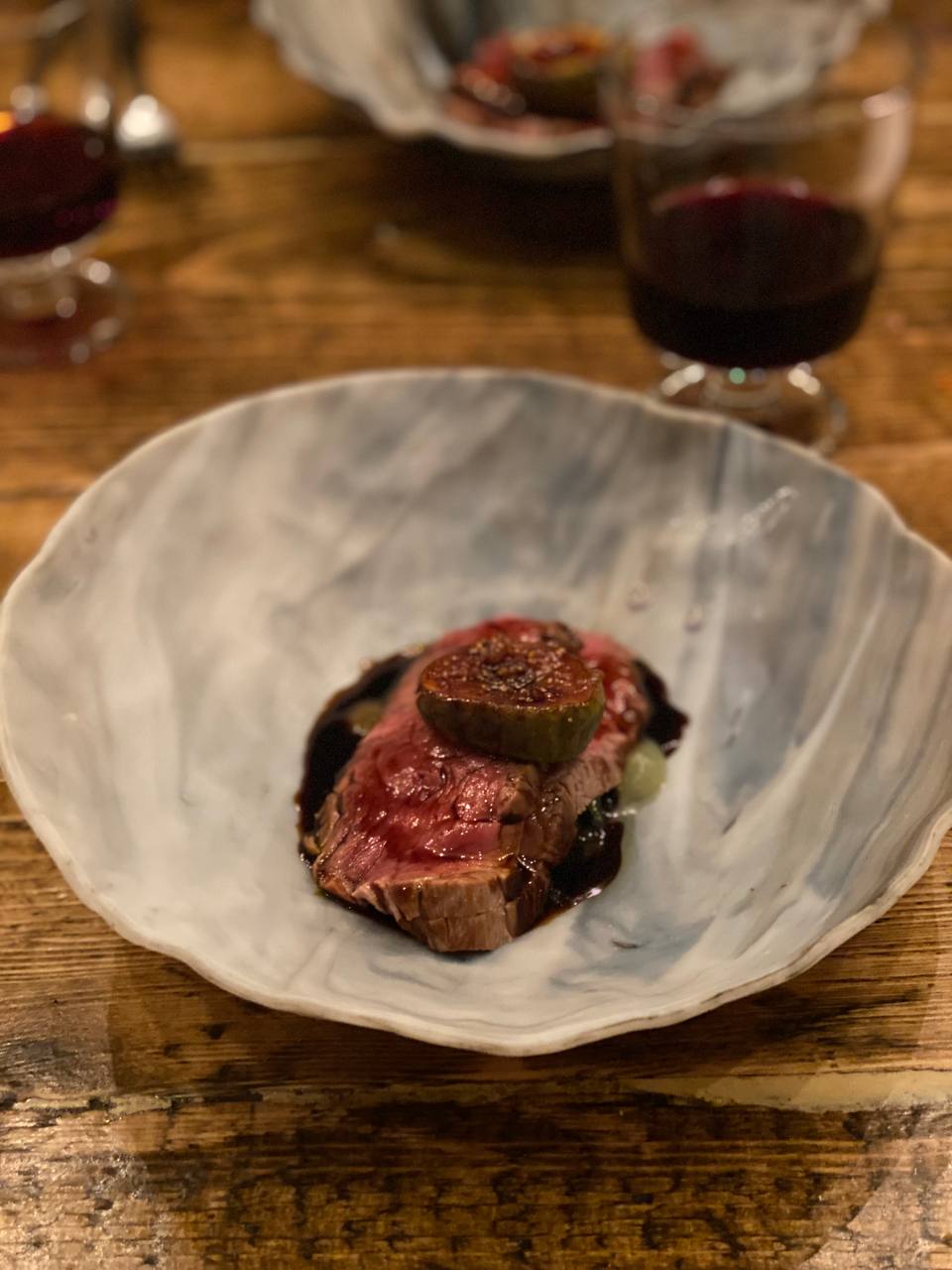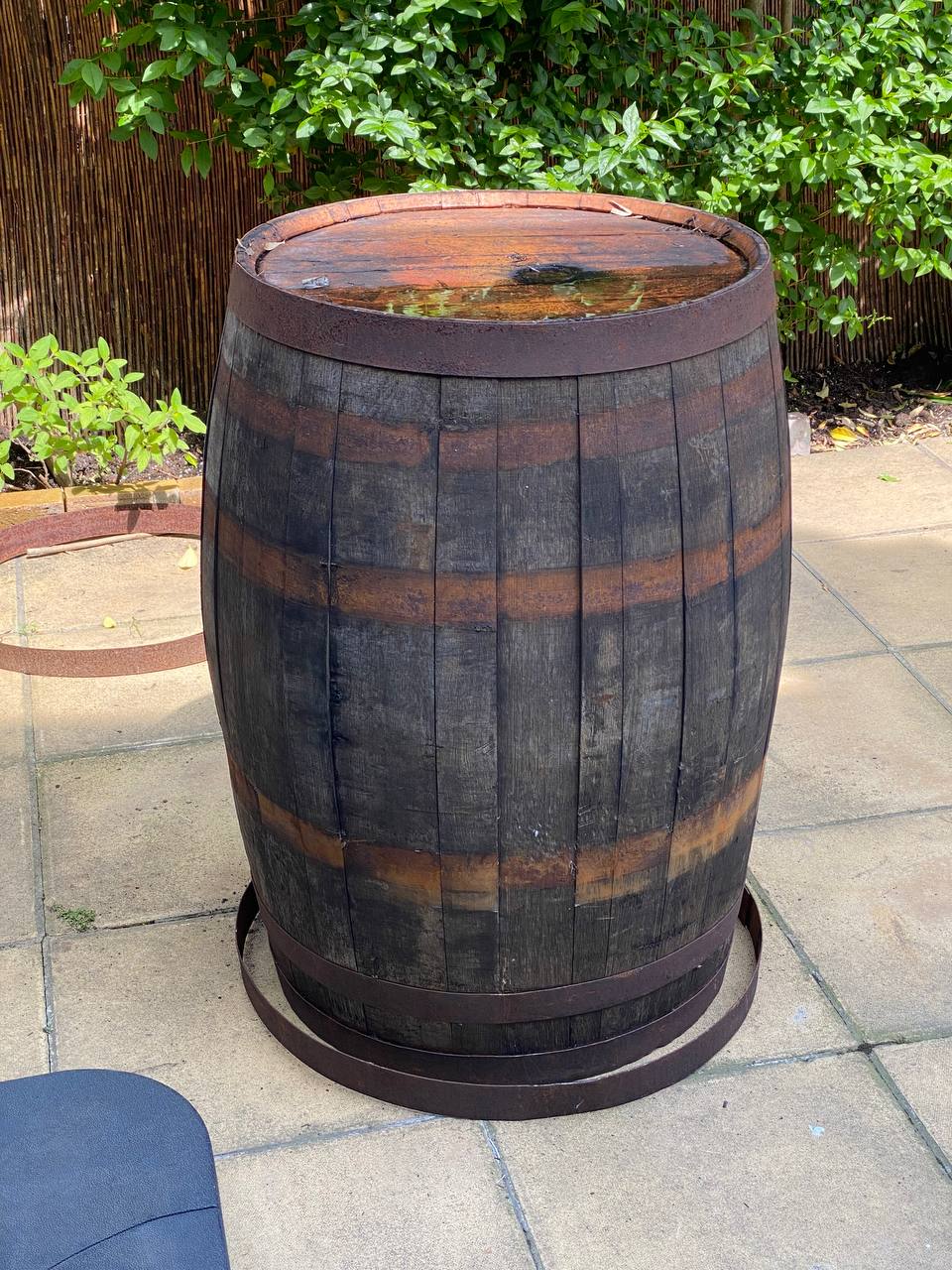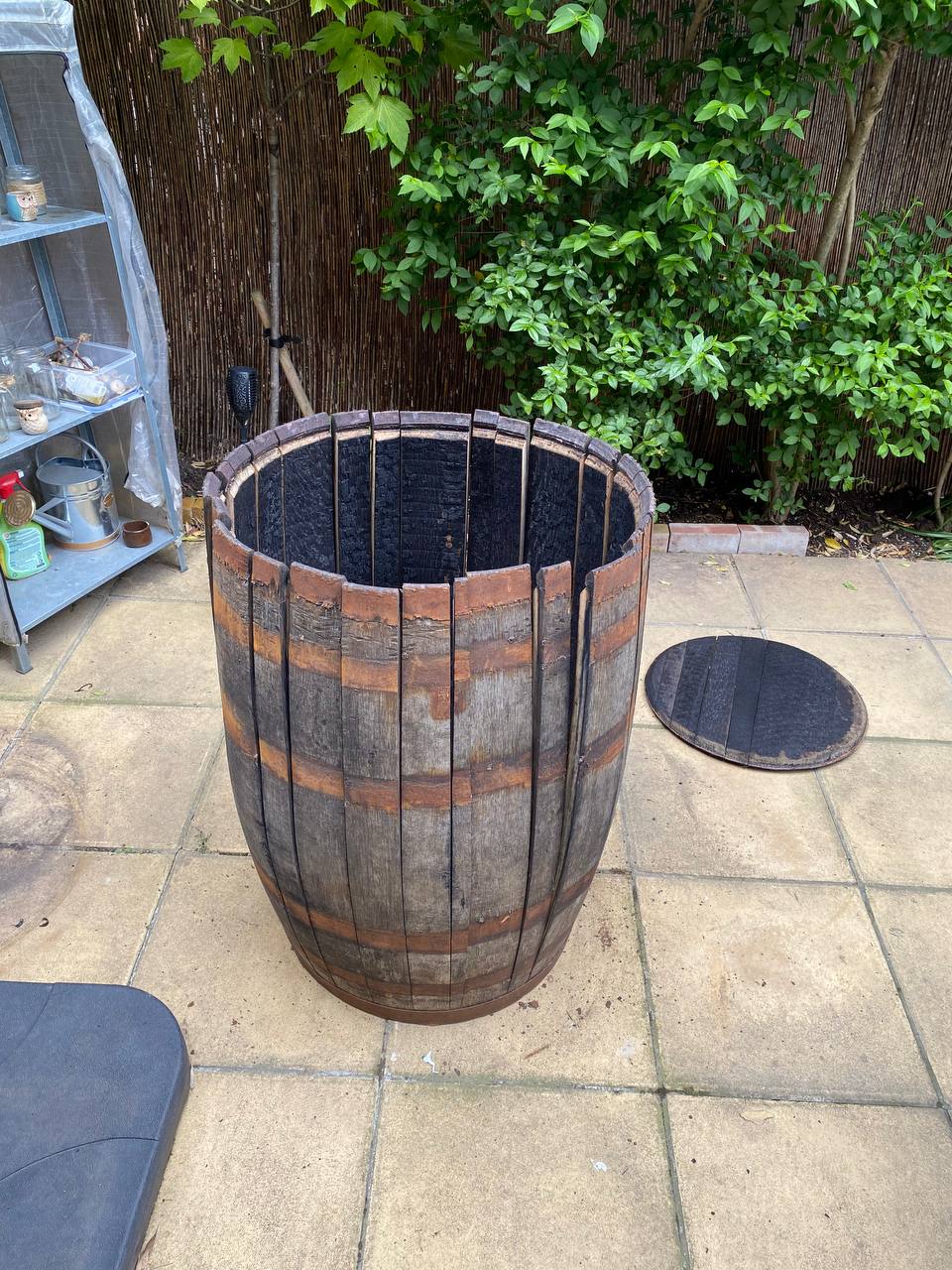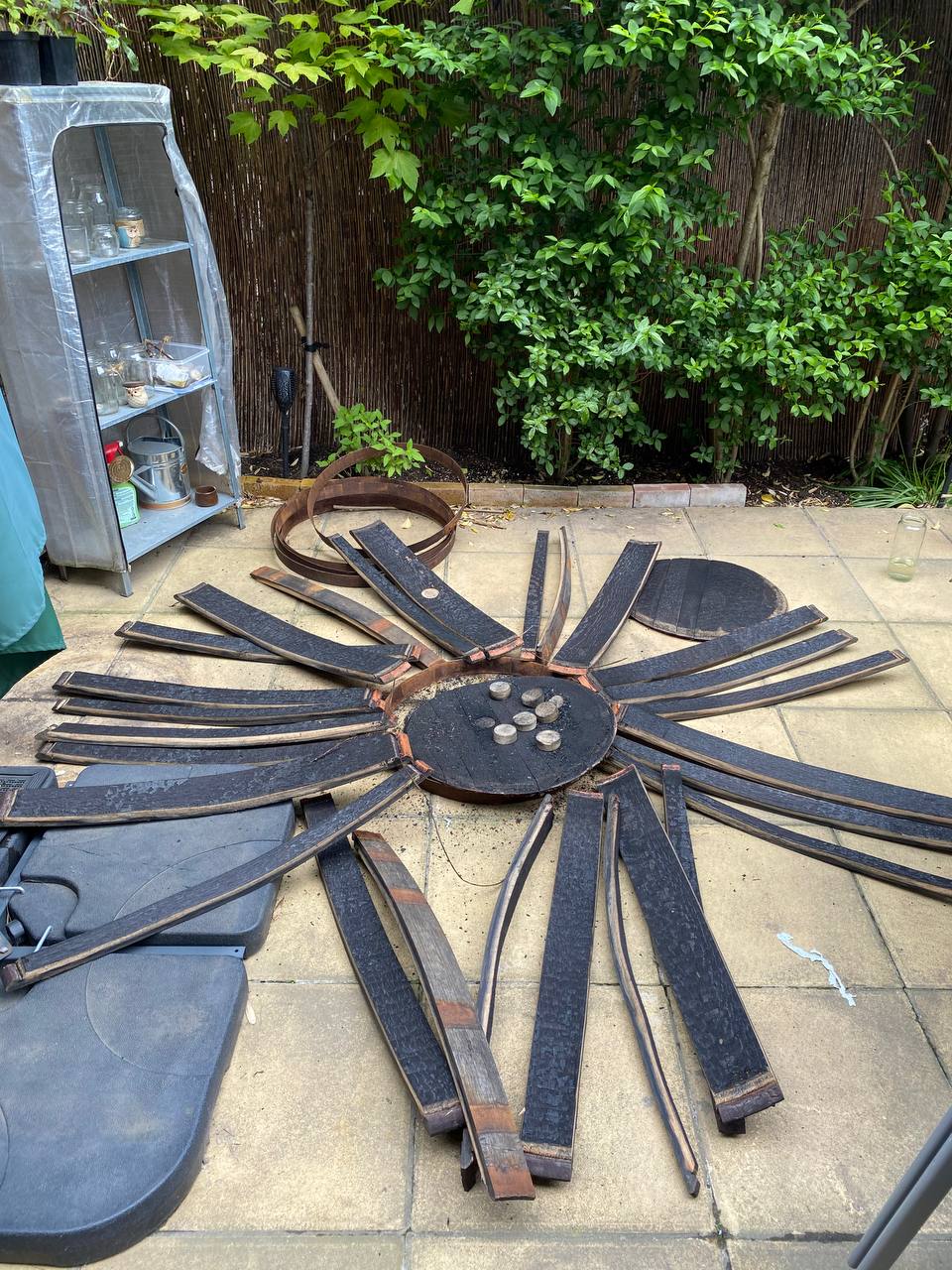#148
On moving
I wish I could tell you that for the past few weeks, I've been actively packing up six years' worth of my life into cardboard boxes (which apparently cost a fortune; as it's been nearly three years since the previous move I already forgot).
Truth be told, I was mostly meeting with friends, trying to cook the rest of the cupboard, and even stopped by for a pop-up dinner by a chef who used to head the closest to me Michelin-mentioned restaurant, which unfortunately closed last month.
The pop-up was located in a small place on the opposite side of the city, but at least the itinerary set the mood right: the last five minutes were spent strolling through a street market where they sold all sorts of offal, tripe, and other questionable animal parts that are probably illegal to peddle on the streets.
The dinner itself was fun: some dishes I really loved, and some would have changed. This beef fillet was served with a delicious jus and a piece of caramelised fig, but fillet is the most bland cut of beef, so could be easily left out of the plate or replaced with a mushroom or aubergine.

These dehydrated tomatoes, on the other hand, were mind-blowing. Each tomato was dehydrated for a different amount of time, and then everything was rehydrated with elderflower vinegar and rhubarb juice. As the result, texture of each bite was different:

Luckily amidst all the socializing I still got the time to pack at least some things.
The most challenging piece was this 200L barrel which is both heavy and covered in rust.

I had to push down all bands one-by-one, at which point it should've felt apart, but as the wood got deformed over years it stayed in place. Those small pieces scattered at the bottom are bungs, or corks. Typically, they are pushed through and replaced with a new one each time liquid is withdrawn from the barrel.

After some more effort, it finally gave way:

Next time I will use this scotch-infused wood to smoke some salmon or brisket.
Enjoying this? Get Tuesday Triage in your inbox every week.
Things I enjoyed reading
1. The war on Japanese knotweed by Samanth Subramanian
The only plant that could affect your mortgage in the UK is this knotweed, and I didn't know much about it before this article (besides it being really invasive):
Disturbing the rhizome in even the mildest way provokes it to grow; shredding it is like lopping off the head of a hydra. Even a thumbnail-size fragment of it, resembling raw, orange-coloured ginger, can generate a whole new plant. (Hence the reluctance of Ryb’s gardener to poke his knotweed and risk carrying rhizome bits away. “He knew they could infect his tools,” Ryb told me.) In excavating knotweed whole, as Ryb had to do, it becomes so vital to eradicate every last grain of rhizome that some surveyors have trained dogs to sniff it out underground. During such projects, Bowes carefully checks the blades of his machines and the tyres of his vehicles, making certain that they won’t bear away any rogue rhizome pieces.
I do know though that some people manage to cook it akin to asparagus, but given how easily it spreads I would probably stir away from it anyway.
2. A visual book recommender by nathanrooy
I really like this approach to recommending books: it starts with looking at how used book stores are better than commercial ones (I tend to agree) because they're curated by humans, not metrics, and moves onto trying to find a mechanic to prompt people to explore other genres of books they don't usually consider:
I think one of the key drivers fueling the high discovery rate at used book stores has to do with the layout. All of my favorite used book stores are located in old buildings that have lots of nooks and crannies. It’s this fractal approach to book layout that I think encourages exploration into areas you wouldn’t explicitly seek out otherwise. This “nooks and crannies” feeling was a major attribute I was trying to recreate with this first iteration.
The technical part of training AI and generating the recommendations looks really interesting too, but seems like I might be lacking some prior training to understand it to its full extent. Maybe I need a book for that.
3. You Have a New Memory by Merritt Tierce
We shape our own reality through our attention and the tools we have, such as the Internet, and with the widespread targeting based on the things we see and say the reality becomes more and more dependent on ads.
But I do, because I’m still human. And I used to think it was ironic when someone posted some hand-wringy article about internet addiction on their Facebook, but now I don’t see it like that. Now I just think about how you’re telling the internet what you care about, and all it knows to do with that is to try to convert your concern into currency. Once it understands that you find something ironic, if you are that sort of person, it will then find a way to push that at you too, trailing ads like seaweed.
As the result, receiving personalized content through advanced technology blurs the border between coincidences and advertising, and seems like people are not happy about it.
4. The Test of Prometheus by georgestrakhov
For nearly a century we argue about the difference between intelligence and humanity, and while ChatGPT-like systems succeed in mimicing human-like intelligence and consciousness, thus almost passing the Turing test, they lack in intentionality:
But despite all the hysteria, the Turing Test is not even close to being passed. And not for the reasons most people tend to talk about. It's not about reliability or hallucinations - people exhibit plenty of that too. It's not about long, chained reasoning around tricky logical problems - this will undoubtedly be solved in the next generation or two. In fact, it's not a technological barrier at all. It's about the current generation of AIs lacking the most basic human faculty: will.
The key question here is whether granting AIs free will and intentions will change their behavior towards humans.
5. How the Trocadero blew London’s mind then vanished for ever by @ChrisWaywell1
This is a pretty cool story for several reasons: first, because I now have a hotel in London I'd love to visit, and second because it tells a story about the city in its prime (and after six years here I regret to see it change):
What’s really odd about the Zedwell, though, is that the building it’s in once had a very different – though still very odd – atmosphere. Its stilled rooms and susurrating carpeted grey corridors once racketed with the sound of hundreds of teenagers hopped up on giant cups of Pepsi playing shooting games and trying to cop off with each other, often at the same time. Over the years, it resonated with go-karts and bowling, with a basement full of aliens trying to dismember you and a fairground ride where it felt like some of your bowel was coming out of the top of your head. It had a giant hedgehog and an escalator SO BIG people talked about it with actual awe. Because once it was the London Trocadero. Now there’s just… sleep. What happened?
Seems like 1980s in the UK were fun as well.
6. The Long Demise of the Stretch Limousine by @jesus_jimz
The closest I got to a limousine was on my high school graduation ceremony, but at some points (probably) parents collectively decided that limousines are too old fashioned and rented us... a tram.
But around that time, many car companies stopped making limos. Specialty coachmakers filled the void by taking a different approach: cutting a sedan in half, inserting a midsection and welding everything together. For about $50,000, custom manufacturers promised deluxe results that could include a TV and even a bed in addition to the obligatory well-stocked bar.
I also never understood how limousines survive in the world where everyone needs to weat a seatbelt but apparently it wasn't required for a while.
7. The Age of the Crisis of Work by Erik Baker
This is not the first article on "silent quitting" I come across, but judging by the people I know and work with, IT as the industry is less affected than I'd think given how common is remote work here.
The evidence for quiet quitting—a concept popularized by a viral TikTok video—is considerably more qualitative, to put it kindly. The best numbers on the subject come from the biannual Gallup study of employee engagement. The data suggests that, since 2019, engagement has indeed declined while active disengagement has risen—but very modestly, and not to historically unusual levels. Unlike resignation, however, the disengagement trend seems to be just as pronounced, perhaps even uniquely pronounced, among white-collar workers. Gallup reports that “managers, among others, experienced the greatest drop” in engagement.
At the same time, we will probably learn for sure only years later, looking at some cumulitive statistics.
8. How is it even possible to cheat on a musical performance practical exam? by Raymond Chen
This is a fun story about cheating at a practical exam for music teachers:
Apparently, all of the other students in the class had conspired to cheat on the exam. They knew from talking with students who had taken the class in the past that the examiners would ask the first student to stick around and be responsible for pulling the slips of paper. The students had decided among themselves who would practice which key’s scales and arpeggios, and their plan was that whichever student was chosen to be the paper-slip-picker would ignore the instructions on the paper and just announce the key that the examinee had practiced.
I won't spoil whether the attempt was successful or not, but just wanted to highlight how many things might go wrong in this plan.
9. The Problematic Myth of Florence Nightingale by Sarah DiGregorio
I studied history for a while but never with enough attention, so more or less learnt about Florence Nightingale only recently, when studying for my Life in the UK test. This is a different take on the same story:
But, like most lone-hero narratives, this one is not entirely true: For one thing, Nightingale herself trained with a group of German deaconess nurses, something she could hardly have done if she invented nursing. She did become famous for advocating for nursing as a trained profession, but as she did so, she shrank nursing into a restrictive, exclusionary Victorian corset, constructing a version of nursing that conformed to rigid social mores, one divided by class, race, and gender—a reimagining of nursing palatable to British colonialism.
Seems like the main author's concern here is that choosing a single hero oversimplifies history and disregards earlier records of other nurses, which is a bit unfair.
10. Meet the Runner Who Leads Every Pack and Then Vanishes by Scott Cacciola
I always pick swimming over running but pacers don't exist in the swimming world (unless it's a fancy name for a metronome) so the article was really interesting:
But Sowinski, who would later nitpick his effort as “a little quick,” did not win. In fact, he did not even finish. After running one more lap for good measure, he stepped off the track to cede the spotlight to the athletes behind him. They were running the mile.
Sowinski, 33, knows how strange it sounds, to be the best in the world at dropping out. But such is the life of a professional pacer, and no one, according to those most familiar with his handiwork, does it better.
I guess I also understand the motivation behind being the pacer, not a competing athlete, as it already moves you up in the hierarchy.
Did you know I make apps?

Theseus
iOS 26 Liquid Glass effects backported to iOS 13+. Because not everyone can require the latest OS.
View on GitHub →Things I didn't know last Tuesday
1. Mitochondrial donation treatment
I read about this procedure in futuristic books and now there is already a baby born here in the UK with DNA from three people.
The technique, known as mitochondrial donation treatment (MDT), uses tissue from the eggs of healthy female donors to create IVF embryos that are free from harmful mutations their mothers carry and are likely to pass on to their children.
I guess while technically it could be called a "three-parent baby", 99.8% of DNA come from the mother and father.
2. Sake Pét-Nat
I tried sparkling sake before (and it was delicious), but didn't know that someone took it further and ferments sake right in the bottle, so it essentially makes it a pet-nat.
For more than a decade now, Japanese sake brewers have applied themselves to mastering the art of sparkling sakes, known as awazake. Nagai Brewery owner-brewer Noriyoshi Nagai perfected his Champagne-method, floral and fine-bubbled Mizubasho Pure after 500 attempts.
There are a few shops that deliver it here in the UK, so I hope to give it a try some time soon.
3. Feudal property
There are no leasehold properties in Scotland, but there used to be quite a few marked "feudal". This is not enforced anymore, but still shows on property listings.
Feudal always meant the land and buildings were owned outright but the feudal superior collected an annual feu duty (this was not a rent) This no longer applies.
By the way, the last time the duty was collected was less than 20 years ago.
4. General health checks are unlikely to be beneficial
I try to look out after myself, but always considered health checks as something more helpful than not. Science doesn't agree:
After analyzing 17 clinical trials involving 230,000 people and comparing adults from the general public who got checked to others who did not, they found that general checkups had “little or no effect” on total mortality or cancer, cardiovascular, heart disease and stroke mortality. Even if it seems counterintuitive, “general health checks are unlikely to be beneficial,” the experts concluded.
I was reading related comments and also learnt that starting workouts after a long break raises liver enzyme numbers to 4-9x of their normal values, which usually confuses doctors a lot.
5. Why woodpeckers can hammer without getting headaches
Hitting your head with 100 g (forces of gravity) would surely kill you, but woodpeckers hammer with 1000 g and feel fine:
Several factors contribute to the bird’s shock-absorbing capability. One is a self-sharpening, chisel-like beak that moves into wood rather than stopping abruptly. (See the illustration above.) Another is strong neck muscles. Reduced space in the cranium also helps, by keeping the brain from sloshing around. And the orientation of the brain itself is important, since it allows the force to be spread over a larger surface area.

(Illustration by Denise Takahashi.)
I also didn't know that they mostly feed on sap, not insects.
6. Hay dust responsible for Swiss cheese holes
For decades scientists thought that cheese holes happen due to CO2 released by bacteria, but this isn't correct:
Experts from Agroscope, a state centre for agricultural research, said the phenomenon – which marks famous Swiss cheeses such as emmental and appenzell – was caused by tiny bits of hay present in the milk and not bacteria as previously thought.
A fun side-effect is that modern cheese produced in sterile environment has less holes, as there is no hay dust in the air anymore.
7. Mystical ‘Fairy Butter’
There is a sweet spread served with scones that is inspired by jelly fungi:
Fairy butter required only four ingredients: egg yolks, orange- or rose-water, sugar, and freshly churned butter, meaning that cooks could whip up this impressive treat in a pinch. Many Americans found such recipes in English cookbooks, including those by Richard Briggs and Charles King published in the mid-18th century.
Back then people thought that jelly fungi are poisonous but now we know that they're mostly fine to eat and tend to absorb other flavours easily.
8. Crossness Pumping Station
Looks like a museum but is a sewage station:
The Crossness Pumping Station is a former sewage pumping station designed by the Metropolitan Board of Works's chief engineer Sir Joseph Bazalgette and architect Charles Henry Driver.

At least now it's finally a museum.
9. Wisconsin Old Fashioned
A fresh entry to my future 100 ways to ruin Old Fashioned book:
The Wisconsin Old Fashioned is the state’s variation on the classic Old Fashioned cocktail, with brandy and lemon lime soda.
At least that's soda, not Coke.
10. Beelining
I like how Wikipedia defines it as "art":
Beelining (also known as bee lining, bee hunting, and coursing bees) is an ancient art used to locate feral bee colonies. It is performed by capturing and marking foraging worker bees, then releasing them from various points to establish (by elementary trigonometry) the direction and distance of the colony's home.
Do you think there are competitive beelining tournaments?
Book of the week
Ruby Tandoh's Cook As You Are is a cook book in its original sense: lots of recipes, no photos as the author doesn't want to impose any constraints, and only a few stories, but it still feels suprisingly wholesome.
The book is aimed at people who cook occasionally, so don't have rare ingredients at hand and don't want to spend hours cooking a single meal. This is pretty much the opposite of what I do most of the time, but I still can appreciate the effort:
I don’t think there’s much point in being a hobby cook – someone with the time, resources and inclination to cook for pleasure – if you’re not able to have fun with it. We all know someone who’s gone wrong on this count: the guy who gets so deep into the science of his morning coffee that he’s forgotten what it means to relax into those first sips, or the person so hell-bent on throwing the perfect dinner party that they don’t ever want to play around with flavours or bend a recipe to their tastes. This kind of cooking – by science, to the letter, of the moment – is fair enough if your job is to cook or if you’re so pressed for time or money that failure just isn’t an option. But if you cook for fun, I beg of you to remember the fun part of the pie, and not take it all too seriously.
With that in mind, I’d ask that you serious food nerds reserve your judgement of this recipe. Yes, salmon is a bit obvious, and yes, sun-dried tomatoes are extremely passé. But just like my favourite podcast rehabilitates the unfairly maligned women of the nineties, I’m here to say that maybe sun-dried tomatoes aren’t so bad after all.
As an average reader cooks to eat, not to entertain, the recipes blend and mix dishes from different cuisines, from tomato and fennel risotto to kimchi muffins, but the most surprising part for me was a dedicated chapter with quick recipes for people with chronic illnesses or disabilities.
Cooking needs to be more inclusive, and this is a great example.
Thank you and see you in a week
(or in a month)!
If you'd like to support the newsletter, please subscribe to the weekly plan. Otherwise you will keep receiving the letters on a monthly cadence – no need to do anything to opt-in.
If you have any questions, or want to suggest a link for the next newsletter, please drop me a message on Twitter or reply to this email.
Cheers! 🍸
Need help with iOS?
I spent a decade on FDA-regulated medical devices and apps with millions of users. Now I help teams ship MVPs, rescue messy architectures, and build the hard bits that don't fit in a sprint.
Learn more →